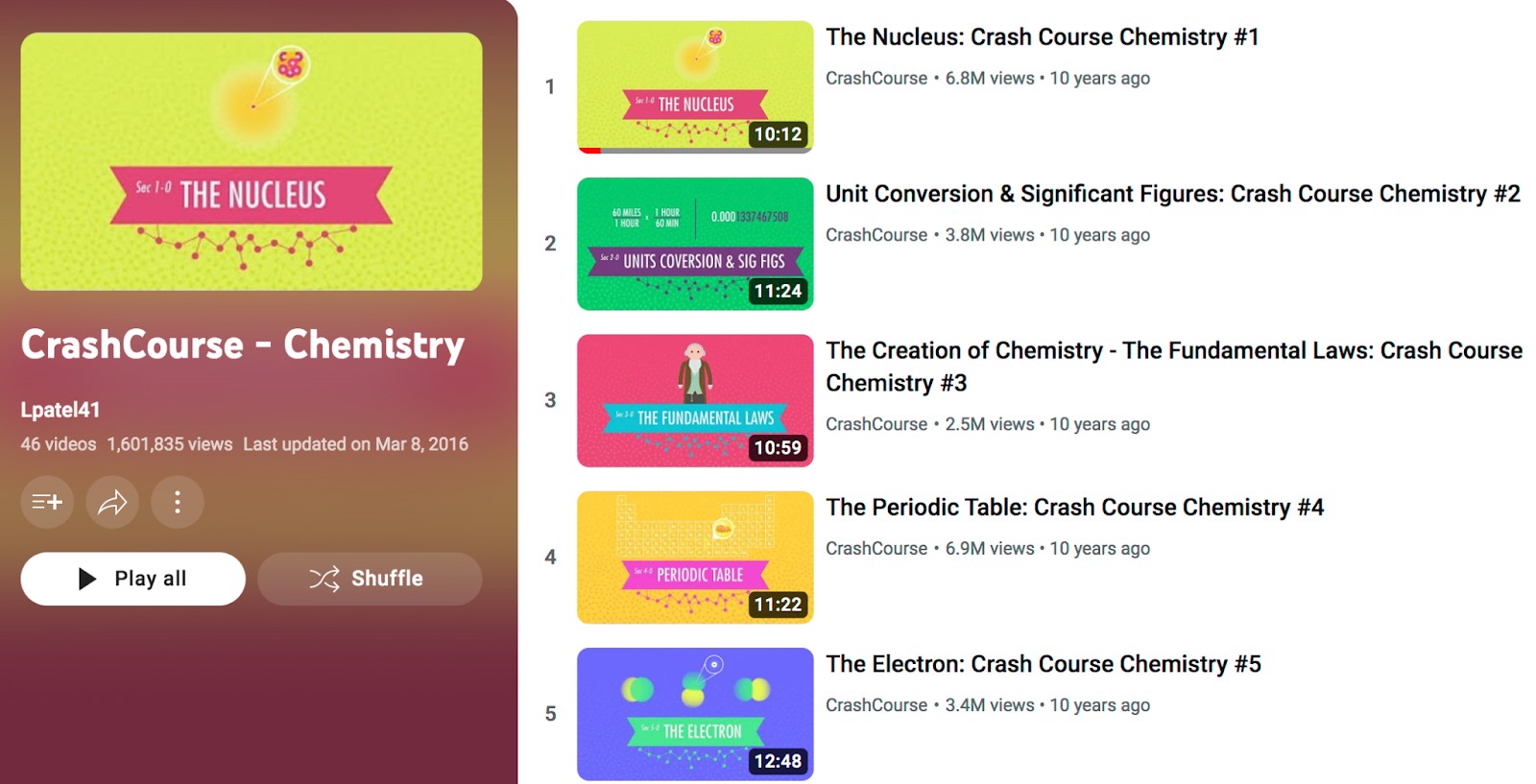Self-learning chemistry can seem daunting. It’s a complex subject requiring abstract thinking, problem-solving, and a deep understanding of core concepts. However, with the right resources and a structured approach, it’s entirely achievable. This guide provides a roadmap for self-learners to build a foundational chemistry education comparable to a college major (excluding lab work).
Embarking on Your Chemistry Journey
This 7-step roadmap provides a structured approach to learning chemistry from scratch:
- Introductory Video Course: Gain a broad overview with Crash Course Chemistry.
- Popular Chemistry Books: Explore engaging reads to gauge your interest.
- Five Branches of Chemistry: Understand the field’s core divisions.
- The Periodic Table: Familiarize yourself with the building blocks of matter.
- Beginner Chemistry Textbook: Dive into fundamental theories and concepts.
- College-Level Textbooks: Systematically study core chemistry disciplines.
- Focus Your Learning: Specialize in a branch that ignites your curiosity.
This guide progresses from general overviews to increasingly challenging concepts and study methods. Feel free to adjust the order or skip steps based on your existing knowledge.
1. Crash Course Chemistry: Your First Step
Crash Course Chemistry on YouTube offers 46 engaging videos providing a comprehensive overview of the field. Covering topics from the periodic table to kinetics and the global carbon cycle, this series provides a perfect starting point for beginners. Each video is concise, making it ideal for grasping fundamental concepts and outlining the field’s scope.
2. Exploring Popular Chemistry Books
Supplement your video learning with popular chemistry books written for a general audience. This helps solidify your interest and provides a more engaging introduction to core concepts.
Consider these recommended reads:
- “Napoleon’s Buttons: How 17 Molecules Changed History”
- “The Disappearing Spoon: And Other True Tales of Madness, Love, and the History of the World from the Periodic Table of the Elements”
- “Stuff Matters: Exploring the Marvelous Materials That Shape Our Man-Made World”
3. Understanding the Five Main Branches of Chemistry
Chemistry is broadly divided into five branches:
- Organic Chemistry: The study of carbon-containing compounds.
- Inorganic Chemistry: The study of non-carbon compounds, including metals and minerals.
- Physical Chemistry: Applying physics principles to chemical systems.
- Biochemistry: The study of chemical processes within and relating to living organisms.
- Analytical Chemistry: Focuses on separating, identifying, and quantifying matter.
Understanding these distinctions provides a framework for organizing your learning as you delve deeper. A short introductory video by Jeremy Krug and online resources can further clarify these branches.
4. Decoding the Periodic Table
The periodic table is the foundation of chemistry, organizing all known elements based on their properties. Learning to navigate the periodic table is crucial. Understanding an element’s position reveals its atomic structure and how it interacts with other elements. Resources like Khan Academy and “The Elements Trilogy” book series can enhance your understanding.
5. Mastering a Beginner Chemistry Textbook
“Introductory Chemistry” by Nivaldo J. Tro is an excellent starting point for building a solid foundation. Designed for high school level, this textbook covers fundamental concepts in a clear and engaging style. Working through this book, including practice problems, will prepare you for more advanced study.
6. Conquering College-Level Chemistry Textbooks
After mastering the basics, progress through college-level textbooks in this sequence: General, Organic, Inorganic, Biochemistry, Analytical, and Physical Chemistry. Utilize supplemental online resources like MIT OpenCourseWare for lecture notes, problem sets, and solutions to enhance your learning.
7. Focusing Your Chemistry Pursuits
Once you have a foundational understanding of the core branches, delve deeper into areas that pique your interest. Explore specialized subfields like environmental chemistry or industrial chemistry. Continuous learning and exploration are key to mastering chemistry. This structured approach empowers you to self-learn chemistry effectively and achieve your learning goals.
